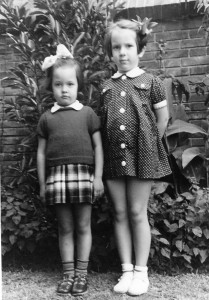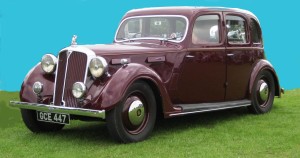Shanghai was occupied by the Japanese from 1942 to 1945. I was ten at the end. The years in between, I was protected by my youth and my parents. They, in turn, were saved from internment by my father’s long dead Danish father. He died in his forties in Amoy, where he was the keeper of the lighthouse, leaving Ah Fang, his tiny Chinese wife, who, with her passel of children, somehow made their way to Shanghai and adulthood under the wing of Presbyterian missionaries. Everyone had Danish papers, a good Christian education and marketable skills as secretaries and accountants.
The war to us meant rationing of certain products and avoiding the occupiers as much as possible. I enjoyed sorting weevils out of rice, and shelling peanuts which were really plentiful and turned into jars peanut butter by Amah. Dashing into shelters with creepy old men when sirens sounded was not as much fun. Explosions and shootings in the street…this was a part of life.
My mother started to explore her interests in health. She had shocked our relatives early by swaddling me as an infant, in blankets and leaving me out on the balcony of our first home, the Embankment building on the Bund. “In the  middle of winter! Can someone talk sense into the woman?” It didn’t help that I became bigger, sturdier and ruddier than all my cousins. Now during wartime, her American psychiatrist was interned, as were some of her bridge partners, who had British papers. Between my father’s business contacts, my mother’s network, and Hong’s country relatives, we managed to obtain some meat, vegetables and the nuts and seeds my mother believed were full of nutrition. My mother came to life during this time. She put up dozens of jars of peanut butter mixed with blackstrap molasses, another easy to obtain food, and we took these to our British relatives in the Yu Yuen road concentration camp. These uncles and cousins were all from my mother’s side of the family. The peanut molasses mix, which I really like to this very day, was considered by my mother to be a complete food to complement the wretched rations the camp dwellers received. After the war, every one of my interned relatives claimed they hated, even rejected this super food. But they all survived, minus teeth, and suffering other forms of malnutrition.
middle of winter! Can someone talk sense into the woman?” It didn’t help that I became bigger, sturdier and ruddier than all my cousins. Now during wartime, her American psychiatrist was interned, as were some of her bridge partners, who had British papers. Between my father’s business contacts, my mother’s network, and Hong’s country relatives, we managed to obtain some meat, vegetables and the nuts and seeds my mother believed were full of nutrition. My mother came to life during this time. She put up dozens of jars of peanut butter mixed with blackstrap molasses, another easy to obtain food, and we took these to our British relatives in the Yu Yuen road concentration camp. These uncles and cousins were all from my mother’s side of the family. The peanut molasses mix, which I really like to this very day, was considered by my mother to be a complete food to complement the wretched rations the camp dwellers received. After the war, every one of my interned relatives claimed they hated, even rejected this super food. But they all survived, minus teeth, and suffering other forms of malnutrition.
At home, war meant that we all tightened our belts. Our beautiful maroon Rover with its dove grey upholstery soon lay in parts on the garage floor, while our chauffeur, who always wanted to be a mechanic, played at reconstructing it. His maroon and dove grey uniform, matching cap and shiny leather boots were stored in his flat above the garage. Gone was his spit and polish appearance, as he worked on the floor in oil stained undershirt and shorts and a pair of flip flops. Our spacious yard was divided in half, with one half turned into a victory garden. Our gardener composted our leftovers and produced amazing tomatoes and greens all year round. Our only casualty was Xiao Liu, who came home one day, collapsed and nearly died. The Japanese had ordered everyone to get shots against common infections, and once you got your jab, you got a certificate that you had to present when required. Many local men feared these shots would make them impotent….so…it was left to an entrepreneur like Liu to get multiple shots and to sell the certificates, until he collapsed in toxic shock. Liu survived, claimed someone had stolen his wad of cash while he was delirious.
His maroon and dove grey uniform, matching cap and shiny leather boots were stored in his flat above the garage. Gone was his spit and polish appearance, as he worked on the floor in oil stained undershirt and shorts and a pair of flip flops. Our spacious yard was divided in half, with one half turned into a victory garden. Our gardener composted our leftovers and produced amazing tomatoes and greens all year round. Our only casualty was Xiao Liu, who came home one day, collapsed and nearly died. The Japanese had ordered everyone to get shots against common infections, and once you got your jab, you got a certificate that you had to present when required. Many local men feared these shots would make them impotent….so…it was left to an entrepreneur like Liu to get multiple shots and to sell the certificates, until he collapsed in toxic shock. Liu survived, claimed someone had stolen his wad of cash while he was delirious.
1937 Rover Sedan
Photo of cousin Sylvia and Joan